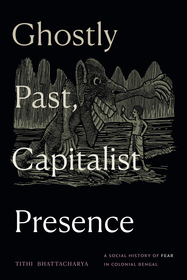
Ghostly Past, Capitalist Presence
A Social History of Fear in Colonial Bengal
- Publisher's listprice GBP 82.00
-
39 175 Ft (37 310 Ft + 5% VAT)
The price is estimated because at the time of ordering we do not know what conversion rates will apply to HUF / product currency when the book arrives. In case HUF is weaker, the price increases slightly, in case HUF is stronger, the price goes lower slightly.
- Discount 10% (cc. 3 918 Ft off)
- Discounted price 35 258 Ft (33 579 Ft + 5% VAT)
Subcribe now and take benefit of a favourable price.
Subscribe
39 175 Ft

Availability
Estimated delivery time: In stock at the publisher, but not at Prospero's office. Delivery time approx. 3-5 weeks.
Not in stock at Prospero.
Why don't you give exact delivery time?
Delivery time is estimated on our previous experiences. We give estimations only, because we order from outside Hungary, and the delivery time mainly depends on how quickly the publisher supplies the book. Faster or slower deliveries both happen, but we do our best to supply as quickly as possible.
Product details:
- Publisher Duke University Press
- Date of Publication 23 August 2024
- Number of Volumes Cloth over boards
- ISBN 9781478026464
- Binding Hardback
- No. of pages232 pages
- Size 229x152 mm
- Weight 476 g
- Language English
- Illustrations 6 illustrations 589
Categories
Long description:
"In Ghostly Past, Capitalist Presence, Tithi Bhattacharya maps the role that Bengali ghosts and ghost stories played in constituting the modern Indian nation, and the religious ideas seeded therein, as it emerged in dialogue with European science. Bhattacharya introduces readers to the multifarious habits and personalities of Bengal’s traditional ghosts and investigates and mourns their eventual extermination. For Bhattacharya, British colonization marked a transition from the older, multifaith folk world of traditional ghosts to newer and more frightening specters. These ""modern"" Bengali ghosts, borne out of a new rationality, were homogeneous specters amenable to ""scientific"" speculation and invoked at sÉance sessions in elite drawing rooms. Reading literature alongside the colonial archive, Bhattacharya uncovers a new reordering of science and faith from the middle of the nineteenth century. She argues that these shifts cemented the authority of a rising upper-caste colonial elite who expelled the older ghosts in order to recast Hinduism as the conscience of the Indian nation. In so doing, Bhattacharya reveals how capitalism necessarily reshaped Bengal as part of the global colonial project."
MoreTable of Contents:
A Note on Conventions vii
Acknowledgments ix
Introduction. Uncanny Histories: Ghosts, Fear, and Reason in Colonial Bengal 1
1. “Undisciplined, Playful and Yet Bhadra”: Old Ghosts and Their Advocates in an Age of Enlightenment 22
2. The New Spirits 55
3. Deadly Spaces: Haunted Homes and Haunting Histories 82
4. Enacting Ghosts: New Spirits, New Rituals 97
5. National Ghosts, Ghostly Nations 130
Conclusion. Thinking about Ends and Beginnings 155
Notes 159
Bibliography 187
Index 203




